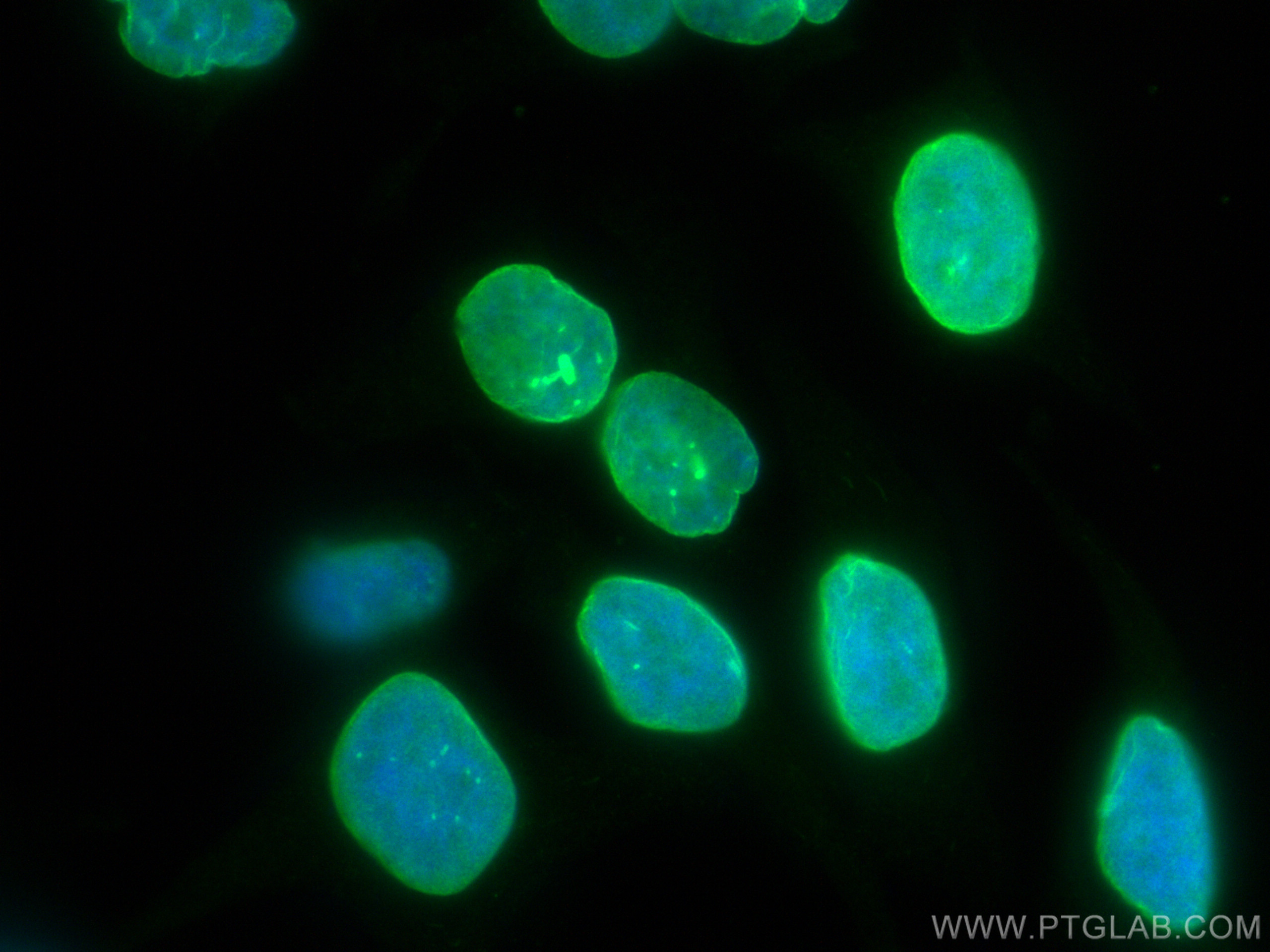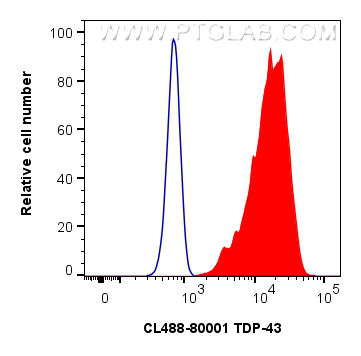验证数据展示
经过测试的应用
| Positive IF/ICC detected in | HeLa cells |
| Positive FC (Intra) detected in | HeLa cells |
推荐稀释比
| 应用 | 推荐稀释比 |
|---|---|
| Immunofluorescence (IF)/ICC | IF/ICC : 1:50-1:500 |
| Flow Cytometry (FC) (INTRA) | FC (INTRA) : 0.40 ug per 10^6 cells in a 100 µl suspension |
| It is recommended that this reagent should be titrated in each testing system to obtain optimal results. | |
| Sample-dependent, Check data in validation data gallery. | |
产品信息
CL488-80001 targets TDP-43 in IF/ICC, FC (Intra) applications and shows reactivity with human, mouse, rat samples.
| 经测试应用 | IF/ICC, FC (Intra) Application Description |
| 经测试反应性 | human, mouse, rat |
| 免疫原 |
CatNo: Ag1231 Product name: Recombinant human TDP-43 protein Source: e coli.-derived, PGEX-4T Tag: GST Domain: 1-260 aa of BC001487 Sequence: MSEYIRVTEDENDEPIEIPSEDDGTVLLSTVTAQFPGACGLRYRNPVSQCMRGVRLVEGILHAPDAGWGNLVYVVNYPKDNKRKMDETDASSAVKVKRAVQKTSDLIVLGLPWKTTEQDLKEYFSTFGEVLMVQVKKDLKTGHSKGFGFVRFTEYETQVKVMSQRHMIDGRWCDCKLPNSKQSQDEPLRSRKVFVGRCTEDMTEDELREFFSQYGDVMDVFIPKPFRAFAFVTFADDQIAQSLCGEDLIIKGISVHISNA 种属同源性预测 |
| 宿主/亚型 | Rabbit / IgG |
| 抗体类别 | Recombinant |
| 产品类型 | Antibody |
| 全称 | TAR DNA binding protein |
| 别名 | TDP-43 (N-terminal), TDP-43(N-terminal), TARDBP, TDP 43, TDP43 |
| 计算分子量 | 43 kDa |
| 观测分子量 | 43 kDa |
| GenBank蛋白编号 | BC001487 |
| 基因名称 | TDP-43 |
| Gene ID (NCBI) | 23435 |
| RRID | AB_3084483 |
| 偶联类型 | CoraLite® Plus 488 Fluorescent Dye |
| 最大激发/发射波长 | 493 nm / 522 nm |
| 形式 | Liquid |
| 纯化方式 | Protein A purification |
| UNIPROT ID | Q13148 |
| 储存缓冲液 | PBS with 50% glycerol, 0.05% Proclin300, 0.5% BSA, pH 7.3. |
| 储存条件 | Store at -20°C. Avoid exposure to light. Stable for one year after shipment. Aliquoting is unnecessary for -20oC storage. |
背景介绍
The TARDBP gene encodes the TDP-43 protein, initially found to repress HIV-1 transcription by binding TAR DNA. TDP-43 has since been shown to bind RNA as well as DNA, and have multiple functions in transcriptional repression, translational regulation and pre-mRNA splicing. For instance, it is reported to regulate alternate splicing of the CTFR gene.
In 2006 Neumann et al. found that hyperphosphorylated, ubiquitinated and/or cleaved forms of TDP-43, collectively known as pathological TDP-43, play a major role in the disease mechanisms of ubiquitin-positive, tau- and alpha-synuclein-negative frontotemporal dementia (FTLD-U) and in amyotrophic lateral sclerosis (ALS).
Proteintech's 80001-1-RR is a rabbit recombinant TDP-43 antibody recognizing N-terminal TDP-43. It recognizes the intact 43 kDa protein as well as all posttranslationally modified and truncated forms in multiple applications. Various forms of TDP-43 exist, including 18-35 kDa of cleaved C-terminal fragments, 45-50 kDa phospho-protein, 55 kDa glycosylated form, 75 kDa hyperphosphorylated form, and 90-300 kDa cross-linked form. (PMID: 17023659, 19823856, 21666678, 22193176)
Recently TDP-43 has been reported to be overexpressed in triple negative breast cancer (TNBC) and it may be a potential target for TNBC diagnosis and drug design. (PMID: 29581274).
80001-1-RR can be used in WB, IHC, IHF. For the ICC (IF with cells) experiment, the results will be better with ethanol fixed cell and dilution 1:50 or 1:100. Another antibody with CatNo. 80002-1-RR is recommended for IF or ICC experiment.
实验方案
| Product Specific Protocols | |
|---|---|
| IF protocol for CL Plus 488 TDP-43 antibody CL488-80001 | Download protocol |
| Standard Protocols | |
|---|---|
| Click here to view our Standard Protocols |



